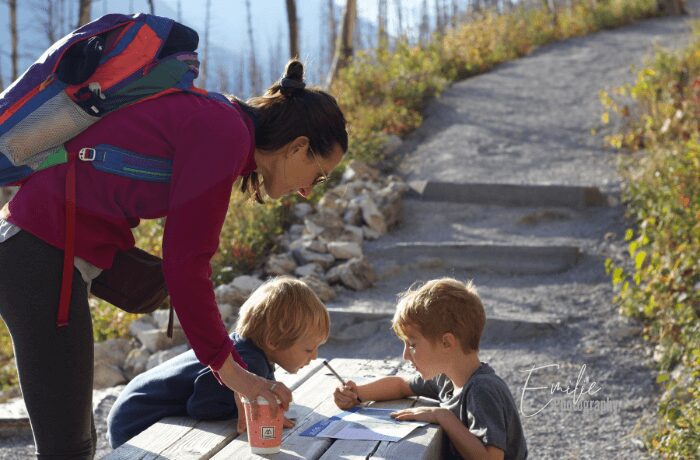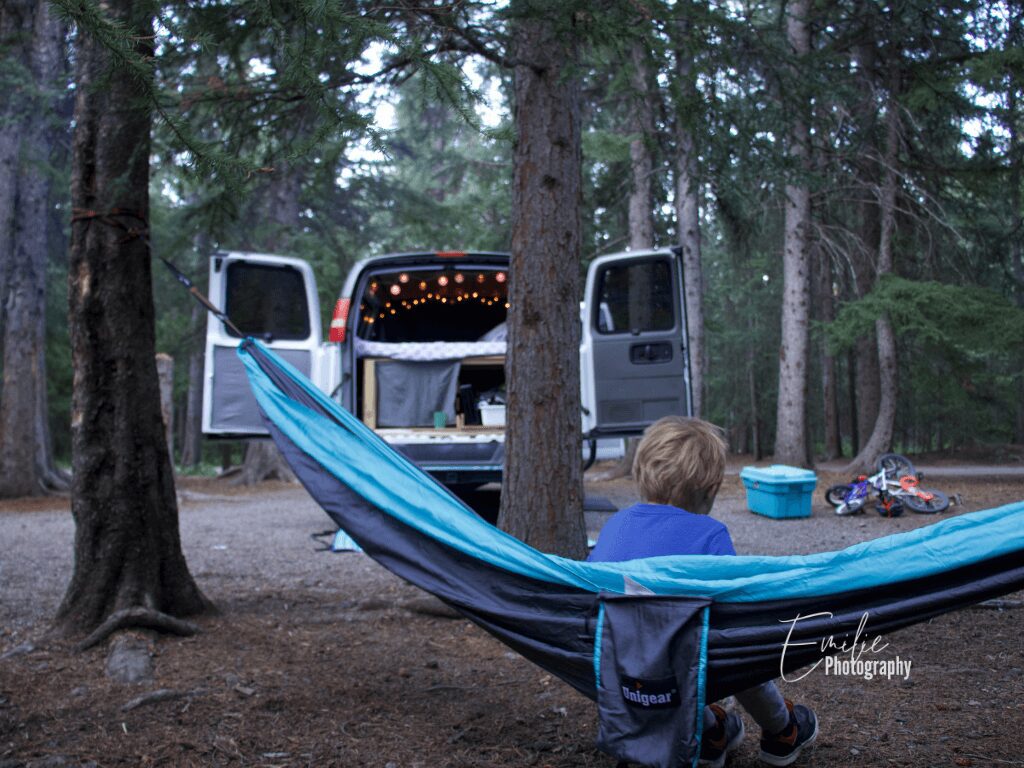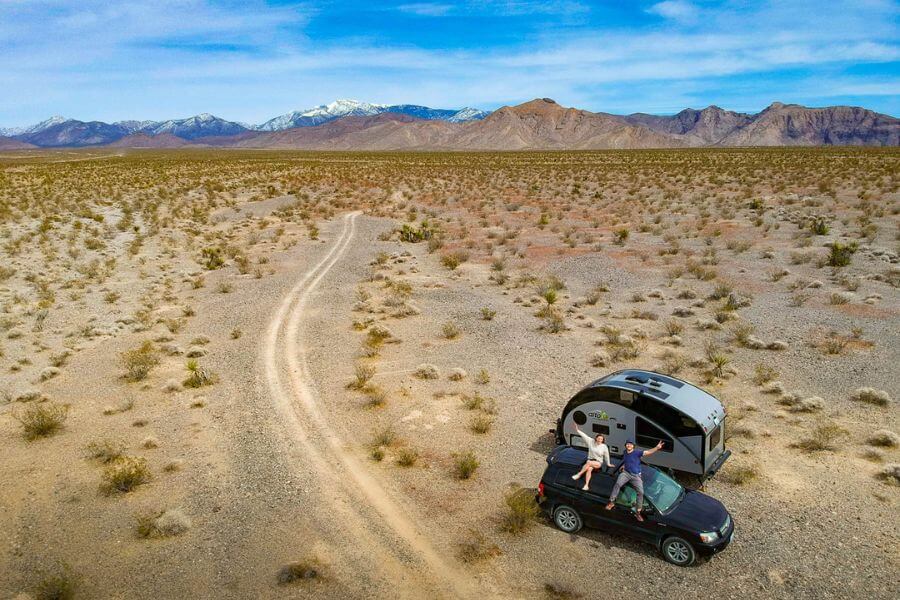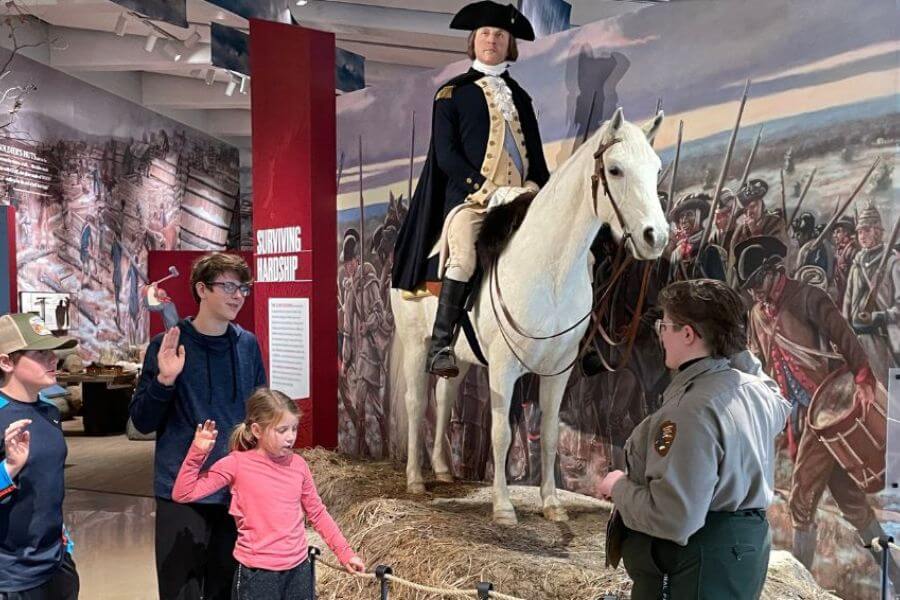Are you wondering what roadschooling is and if it’s a good plan for your family?
Imagine. No more PTA meetings, bake sales, or teacher-parent conferences where you awkwardly make small talk with other parents while waiting for your turn.
Instead, the world becomes your classroom, and you and your children can learn valuable lessons together.
You get to travel wherever you want, whenever you want, with your kids and teach them along the way.
With the help of other roadschooling families, we’ve created this guide to demystify roadschooling, how to get started, which roadschooling curriculum to use and what it really looks like to be a roadschooling family.
Disclaimer: Just a heads up, this free article contains affiliate links. If you purchase after clicking one of these links, I may earn a small commission at no additional cost. Also, as an Amazon Associate, I earn from qualifying purchases. Your support helps me continue to provide helpful and free content for you.

What Is Roadschooling?
Roadschooling is when you homeschool your children while travelling. Since saying “homeschooling on the road” can be quite a mouthful, “roadschooling” became a very popular term.
Roadschooling allows parents to take their kids on trips without being confined to traditional school schedules. Like homeschooling, parents teach their children themselves rather than sending them to public schools. And instead of teaching them from home, they teach them on the road.
Plus, with all the information online now, roadschooling can be just as effective as any other type of standardized curriculum.

What are the Benefits of Roadschooling?
There are many benefits to roadschooling including:
- Parents get to spend more time with their kids throughout the year
- Kids get to learn in a more hands-on way. They will get endless opportunities to learn on the road.
- Travelling families can expose their kids to more cultures, languages, and history in a way that will “stick”
- Students (children) get more 1:1 time with the teacher (parents), which can help create a unique learning experience tailored toward the kid
Now that we know more about what roadschooling is and why it’s such an interesting concept let’s see how to get you started on your roadshooling journey.
What a Roadshooling Schedule Looks Like?
When you road school (or homeschool your kids), you don’t need to sit for a full day with your curriculum.
Typically, families will set 30 to 90 minutes of academic work (in books) per day. The rest of the day, they work on various aspects of the school in an informal way through planned activities.
Moreover, school is not just about books. Seeing all the learning, they do through this experience is a great satisfaction.
The perfect combination for a roadchooling schedule is a mix of:
- formal curriculum for mathematics, reading and writing
- free learning from your travels for all the other topics
Resources to Get Started on Your Roadschool Adventure
Here are a few resources to help you start your roadschooling adventure and hit the road.
Your Local Education Department
Every country and state has its laws and regulations about children’s education. The first thing you should do before becoming a roadschooling family is to know the regulations of your place of residence.
You need to be aware of the homeschool laws in your state of residence.
While most countries allow families to be an integral part of their children’s education, there are still some places where physical presence in a school is mandatory. In those places, homeschooling is technically illegal.
Depending on where you live, you may have to report the progress of your child’s education to an academic board. Your kids may have to do some official tests throughout the year, and you may have to send in an educational project at the start of each school year.
You can ask your local school district for some guidance.
The Call of the Wild and Free: Reclaiming Wonder in Your Child’s Education
One book that other roadschooling families recommended many times was: The Call of the Wild and Free: Reclaiming Wonder in Your Child’s Education.
This book gives you tips and inspiration for creating quality education at home. Freedom, adventure and outdoor living are keys to this book and I think it will resonate with many families who travel often.
Travel and Homeschooling Facebook Groups
Facebook groups focused on homeschooling and travel is also great resources for educating children on the road. There’s a lot of great information you can find.

How to Afford Roadschooling?
Plan your Budget
Start by creating a budget considering all your expected expenses, including transportation, food, and accommodation. Make sure to also account for educational expenses, such as books, online courses, and educational activities.
The idea behind roadschooling is to homeschool while travelling so you want to plan some money for travel and fun activities.
Cut Expenses
Tip by Jessica from Uprooted Travel
Consider ways to reduce your expenses, such as staying in free or low-cost campgrounds, cooking meals instead of eating out, and finding free or low-cost activities and educational opportunities.
If you’re road schooling while road-tripping or living in an RV, one of the best ways to save money on the road is by staying at free campsites.
For example, in the United States, you can camp for free on most land managed by the Bureau of Land Management, National Forests, and certain properties owned by certain states’ Department of Natural Resources.
This is called dispersed camping. In Canada, it’s called random camping (when you stay on the crown’s lands)
The best way to find these sites are by using some of the best RVing apps, like Boondocker Welcome, The Dyrt, Campendium, or iOverlander, which provide maps and filters where you can search for free camping, whether the campsites are well-suited for whatever kind of rig you’re driving, and even whether the sites have strong cell signal, if you rely on your cell phone carrier’s data plan to get internet.
You can also try Harvest Hosts, where you’ll stay on farms, museums or vineries. Those rural stays are also perfect learning opportunities for your children.
➡️ ➡️ You can read our review on Harvest Hosts here
The less money you spend on campsites, the more you’ll have to spend on the road and exploring with your family!
Work on the Road
Consider working while on the road to help cover expenses. This could be anything from freelancing to part-time jobs or starting a business you can run from the road.
Some roadschooling families also find seasonal jobs on campgrounds. It’s the perfect way to earn money and be hosted at a campground.
It takes some adjustment to balance work, travel and kids, but it’s possible to do it.

What are the Best Roadschooling Curriculums?
There are many different ways of approaching roadschooling. Some families will stick to a formal curriculum, while others may use a more “unschooling” learning approach.
There is no one-size-fits-all plan for your kids, which means you’ll need to assess their learning styles and your goals.
The most important thing is to ensure your kids get a quality education.
Here are a few examples of roadschooling curriculums and online schooling:
Sign up for Online Schooling
Tip by Jenny from TraveLynn Family
Understandably, the pandemic put many parents off homeschooling their kids. It’s not for everyone. But if you want to take your kids out of school to travel and keep on top of their curriculum, you can sign up for online learning for family travel.
The pressure of homeschooling is alleviated by parent(s) through the magic of modern technology whilst you adventure the globe as a family, making those precious memories!
The only restrictions are a good WIFI connection and a tablet/laptop.
When we deregistered our kids from their UK school to travel to Morocco for 4 months (ages 7 and 8), we signed them up for a private online tutor to do 30 minutes of English and 30 minutes of maths each per week.
They also did DoodleLearning every day. This is an app for maths, English, times tables, and spelling. Despite the short allocated time of academic learning, the focused and personalized approach meant they didn’t fall behind the curriculum and slipped straight back into school on our return.
The pressure was off for official schooling, and we could focus our time and enjoyment on everyday travel experiences, which provided a valuable education for all the family.
Use the Junior Ranger Program as a Roadschool curriculum
Tip by Kyleen from The Bonnie Traveler
Planning meaningful, fun, and educational stops between major attractions or destinations is a great way to enjoy road schooling with kids.
One way to do this is with the U.S. National Parks Services Jr. Rangers Program. This activity-based program allows kids to engage in activities at over 400:
- national parks
- historic sites
- national monuments
- national seashores
- national recreational sites
- and virtual sites online
The program is geared toward children ages 5-13, but anyone (even mature kids at heart) can complete the activities. The number of activities to complete is based on age.
Each location has booklets with unique assignments. Some activities include word searches, drawing observations, or finding historical, scientific, or geographic facts around the park.
Once you have completed the activities, a ranger will swear you in as an official Jr. Ranger who promises to “explore, learn, and protect” the National Parks. You will also receive a badge with the location name (which makes for a great souvenir).
If you are an activity family who loves bike tours or adventure experiences, the Jr. Ranger Program is the perfect blend of nature, history, and excitement, and it is a great way to spark curiosity and wonder.
If you’re road-tripping through Canada, the Parks Canada National Parks Xplorers booklets are also brilliant. You and your kids will love this initiative. It will give you a focus on each place you visit, and we will complete all the tasks.
The Park Rangers are brilliant, and I was so moved by the pledge they had to make each time. I remember the ranger in Jasper being chatty and engaging the children learned a lot from him. This gave us a focus, and a souvenir as the children collected the tags as we went.
Use Audiobooks for Social Studies and Literature
Tip by Jenn Warren from Dinkum Tribe
One of our best tips for road schooling is to use audiobooks to cover large amounts of material on the road. We bought the audiobook versions of Story of the World (classical social studies curriculum), and we played them for 30-60 minutes each day of a long road trip.
Audiobooks are also perfect for keeping kids entertained on road trips.
Story of the World is a K-8 curriculum, but it’s written so well that even teens and adults enjoy it. The kids listen and work on colouring pages, map work, or outlines (older kids). We often pause to discuss each chapter together as a family.
We also include literature studies by borrowing relevant historical fiction audiobooks from the library. We recently listened to “The Little House on the Prairie” while driving through the Kansas prairies. We had many opportunities to discuss controversial points and imagining the main character’s experiences living in the remote prairies as a pioneer was easy.
It was unforgettable!”
Teach Your Kids Authentic Writing
Tip by Erin from Wanderlust With Kids
One great way to get your kids interested in learning while on the road is by creating authentic writing experiences. Encourage them to create their own road trip journal to document their experiences and observations as your family travels from place to place.
Young kids can draw a picture each day or for each place you visit, and parents can write a short sentence to help describe the memory of that day. If your child begins to write, they can add short sentences or words to describe their daily experience. Older kids can use their journals to write longer descriptions of places they visit or even stories that emerge from the adventure.
This activity can also be adapted to fit any theme. For example, a student who loves geography might create a journal that records all the different landmarks and geographic features they encounter on their journey.
Kids can write down information about:
- local landmarks,
- interesting facts about the places you visit, or even
- details about the people you meet along the way.
This is a great way to integrate authentic writing into travel
Teach These 3 R’s: Research, Rhetoric, Resourcefulness
Tip by Robyn from Nomads With A Purpose
With smartphones, YouTube, and AI technology such as ChatGPT, reading and writing skills are much less important today. While kids should still learn the basics of reading & writing, we don’t need to spend nearly the amount of time on it that we used to.
Today, if you can deliver information in entertaining, inspiring, or creative ways, you will have an edge in the competitive freelance and entrepreneurial world we are heading into.
Once my kids had a basic ability to read and write, we focused on 3 new R’s— rhetoric, research, and resourcefulness.
I applied this by allowing them to take anything they found interesting at the time, whether it was photography, art, music, history, or even dogs. Instead of me providing textbooks on these subjects, I’d tell them to research it on the web, on YouTube, in podcasts, or to find courses on it.
Then, they’d have to turn around and be able to “sell me” on it, or at least present it, in whatever form of communication— blog, podcast, YouTube video— that felt most effective.
While many of these interests faded over time, the skill set they learned has allowed my 3 kids to run multiple blogs and do freelance work because they spent their time developing these skills by memorizing facts, writing essays, and taking tests.
Roadschooling Curriculum and Online Schools Favourites
When it comes to homeschool curriculums and online schools, there are thousands of resources available, but here are a few favourites from home/roadschooling families I took up to:
The Good and Beautiful offers free and paid curriculum/activities for children of all ages. Their ultimate mission is to make homeschooling more rewarding by offering fun activities while teaching essential skills.
Khan Academy is a nonprofit organization whose mission is to provide a free world-class education for anyone anywhere. They have courses in math, science, art history and more.
Outschool offers homeschooling and traditional learning in a small group setting. It’s a good way for homechooling kids to learn while interacting with other kids.
When it comes to school curriculums and booklets, you want to ensure you can easily carry everything. Plus, you don’t wait to rely on a printer and a computer, especially if you plan to camp in more remote locations.
A booklet-based curriculum is ideal when on the road. You can always stop at public libraries to print more sheets, but you’ll have a good base.
Once the booklets are completed, you can digitize the work and recycle the paper..
For children’s books, you can buy second-hand books and exchange them when you’re done reading them.
How to Roadschool: Tips to Help You Homeschool on the Road
Roadschooling families are giving you their best tips to help you homeschool on the road (or roadschool if you prefer).
Be Flexible
Tip by Jenny from Explore Essaouira
One of the biggest advantages of road schooling is that families do not need to be restricted by timetables; days can flow with moods and what a location offers.
When kids are motivated, perhaps inspired by a fun day out, jump on that enthusiasm. But similarly, they may be tired after a few days of big attractions or sightseeing and not have time to get any school work done.
Don’t stress.
A few downtime days are needed, and this may be an opportunity to catch up with schoolwork.
When we travelled to Morocco with our kids for 4 months, we found that little academic schooling took place whilst we travelled quickly. Our days were jam-packed with travel experiences (which were invaluable learning). But when we settled in Essaouira for a month and slow travelled.
This gave everyone more space and time to catch up on work and schooling, refreshed after our adventures. But similarly, we would move learning sessions around surf lessons and medina exploring.
Routine works for some families, and that’s great. But sometimes, it’s good for the soul to mix things up and go with the flow. Plus, don’t stress. You’ll be amazed how much learning happens in those one-on-one sessions compared to a classroom environment.
Find Roadschooling Activities that Your Children Enjoy
Tip by Laura from The Traveling Elms
Our favourite roadschooling activities while travelling usually include visiting local attractions or taking in the area’s natural beauty. We take advantage of any unique opportunities from travelling in different places, such as:
- going on a boat ride alongside dolphins or
- watching the sunset at the beach.
We also take time to appreciate our area’s local culture by:
- attending festivals,
- visiting churches and monuments, and
- learning about the locals’ customs and beliefs.
We also love science kits and art projects, along with reading books about local history. For example, when we visited the Alamo, we read a book about the history of the battle and imagined what it would have been like to be there.
Another thing we do is collect items from each area to use in our homeschooling studies and projects. This could include rocks from different areas of the canyon or shells from the beach. Learning outside the classroom has been incredibly rewarding for our family, as we have made memories that will last a lifetime.
Final Thoughts: Roadschooling With Your Kids
Roadschooling offers many opportunities to learn through travel and life skills. Having a child-centred approach to education is essential.
And you’ll quickly realize that travel enriches this.
A few workbooks, nature journals, diaries and books to read are a start for your roadschooling journey, whether you’re planning on travelling full-time or part-time.
Related Articles – Road Tripping With Kids
If you’re planning a family road trip, you might want to read those articles:
- 21+ Camping Road Trip Essentials (Checklist Included)
- The Best Road Trip Snacks for Kids (& Some Are Healthy 😉)
- 37 Road Trip Quotes to Be Ready to Hit the Road
Emilie is the founder of Love Life Abroad. She helps moms plan epic road trips and outdoor adventures with their families. Because who said adventuring had to stop once we have kids? She’s based in the Canadian Rockies and shares her love for the region as well as other unique places in Canada & USA. She works with tourism boards and outdoor brands to inspire families to experience new unique destinations and outdoor activities.
